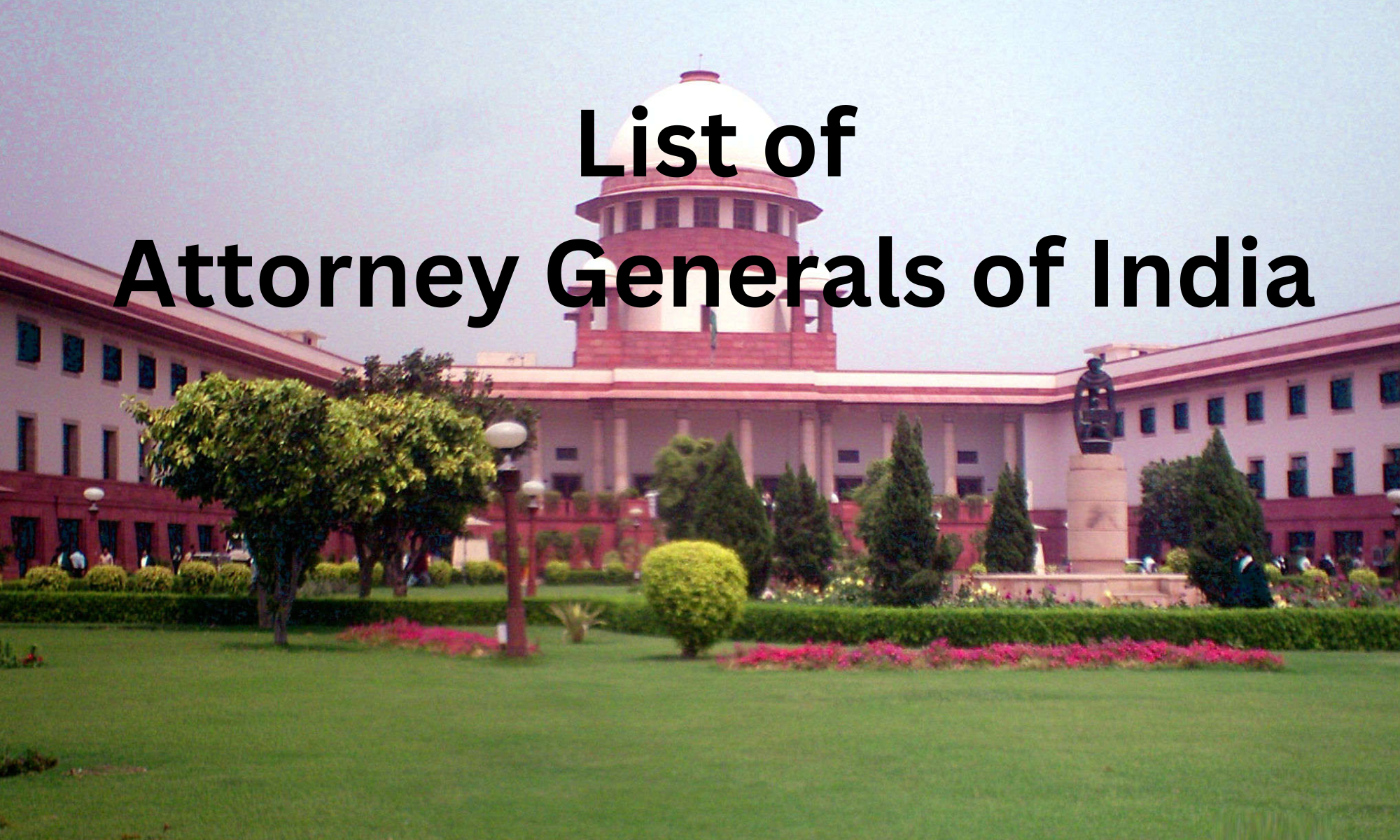List of All Attorney General of India: The Attorney General of India is the chief legal representative of the Central government before the Indian Supreme Court. In Part V of the Indian Constitution, Article 76, the position of Attorney General and its duties are briefly outlined.
Attorney General of India
- The job of Attorney General of India is outlined in Article 76 of Part V of the Indian Constitution.
- The Attorney General serves as the main legal counsel for the Union Government. They are in charge of representing the Indian government in court.
- Politics shouldn’t be taken into consideration when choosing the attorney general.
- R Venkataramani, a senior Supreme Court lawyer, has been appointed to the position of Attorney General of India for a three-year tenure.
- The highest court in India has employed attorney R Venkataramani for 42 years.
- He joined the Tamil Nadu Bar Council in 1977, and in 1979 he started working for Senior Supreme Court Advocate PP Rao.
- In 1982, he started his own solo practise in the Supreme Court, and he was given the title of Senior Advocate of the SC in 1997.
In addition to constitutional law, indirect tax law, human rights law, civil and criminal law, consumer law, and laws governing services, he worked in the legal profession in many other fields. He was invited to speak at a workshop in Geneva in 2001 by both the UN High Commissioner for Human Rights and the International Commission of Jurists. With this workshop, the Human Rights Commission was to receive a report on the 1966 Optional Protocol to the International Covenants on Economic, Social, and Cultural Rights (ICESCR).
Venkataramani, a senior attorney, took part in ICESCR-related activities of the International Court of Justice in the Afro-Asian region. In 2010, he joined the Law Committee, and in 2013, he came back to serve another term. He will now take over as India’s attorney general from K K Venugopal.
List of Attorney General of India
| Name of the Attorney General | Tenure |
| M.C. Setalvad | 28 January 1950 – 1 March 1963 |
| C.K. Daftari | 2 March 1963 – 30 October 1968 |
| Niren de | 1 November 1968 – 31 March 1977 |
| S.V. Gupte | 1st April 1977 – 8th August 1979 |
| L.N. Sinha | 9th August 1979 – 8th August 1983 |
| K. Parasaran | 9th August 1983 – 8th December 1989 |
| Soli Sorabjee | 9th December 1989 – 2nd December 1990 |
| J. Ramaswamy | 3rd December 1990 – November 23rd 1992 |
| Milon K. Banerji | 21st November 1992 – 8th July 1996 |
| Ashok Desai | 9th July 1996 – 6th April 1998 |
| Soli Sorabjee | 7th April 1998 – 4th June 2004 |
| Milon K. Banerjee | 5th June 2004 – 7th June 2009 |
| Goolam Essaji Vahanvati | 8th June 2009 – 11th June 2014 |
| Mukul Rohatgi | 12th June 2014 – 30th June 2017 |
| K.K. Venugopal | 30th June 2017 – September 22nd , 2022 |
| R. Venkataramani | 1st October 2022 till date |
Attorney General of India: Who appoints Attorney General of India and what is the Tenure?
The president appoints the attorney general. He must be a citizen of India and have served as a judge in any Indian state for five years or for ten years in the high court. The President may also view him as a notable jurist. The Constitution makes no mention of how long the Attorney General’s appointment will last.
Regarding the removal process and the reasons for removal, the Constitution is equally silent. They can therefore be removed at any time and are hence subject to the whim of the president. He or she may also resign by submitting a letter of resignation to the President. The Attorney General’s compensation is at the President’s discretion and is not subject to any constitutional restrictions.
Along with performing any other legal duties the president may designate, he or she also provides legal advice to the Indian government on the matters the president brings up. He also complies with the requirements imposed by the Constitution or another piece of legislation.
The president speaks on behalf of the Indian government whenever he refers a case to the Supreme Court in accordance with Article 143 of the Constitution. Additionally, he shows himself in front of any high court upon the government of India’s request in any issue involving the government of India.
More about Attorney General of India:
The Attorney General is not a member of the Central Cabinet, but a separate law minister who oversees legal concerns at the federal level of government is. The Attorney General is bound by some restrictions, which he ought to be aware of to avoid a conflict of interest.
It is inappropriate for the Indian Attorney General to offer suggestions or submit a statement that is critical of the Indian government. Unless requested by the Department of Legal Affairs of the Ministry of Law and Justice, he or she should refrain from providing advice to any ministry or department, statutory body, or public sector organisation of the government of India.
However, the Attorney General neither works for nor is a full-time legal advisor to the government. Furthermore, it is legal for them to practise law in private. Without the government of India’s consent, he or she must not represent a person who has been accused of a crime. He or she shouldn’t consent to serve as a director for any company or organisation.



 Current Affairs Questions asked in Railw...
Current Affairs Questions asked in Railw...
 Happy Children’s Day 2023: Date, History...
Happy Children’s Day 2023: Date, History...
 International Girl Child Day 2023, Histo...
International Girl Child Day 2023, Histo...


